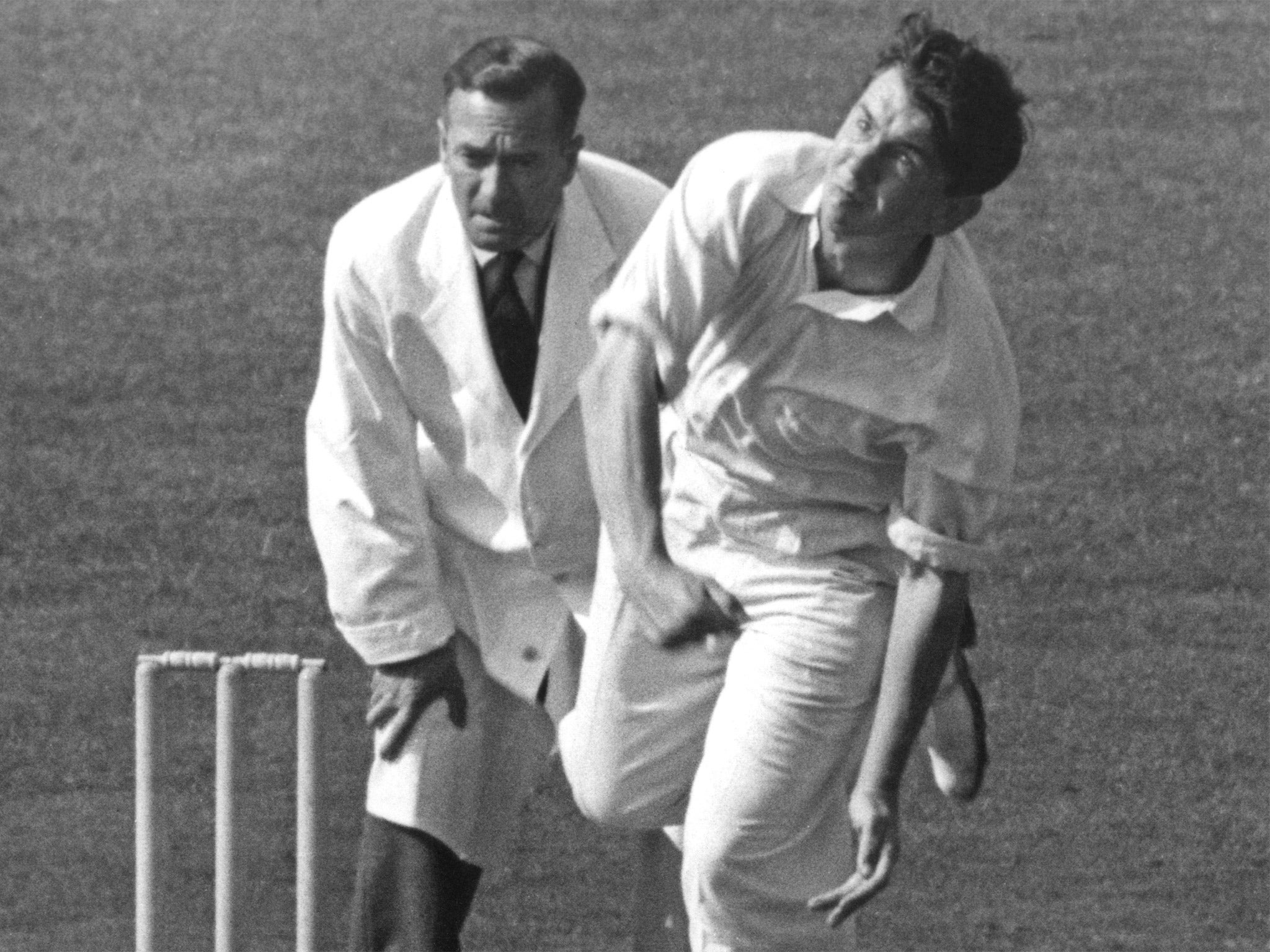David Allen: Off-spinner who bowled Gloucestershire and England to many memorable victories

The end of the Lord’s Test of 1963 was one of cricket’s most dramatic moments. England, wanting six runs for victory, lost their ninth wicket in the final over, and, in an atmosphere of high excitement, out of the pavilion came Colin Cowdrey, with his left arm in plaster. The West Indian Wes Hall, the fastest bowler in the world, had two balls left, and England survived for the most heroic of draws.
In fact, the batsman required to face the two balls was not Cowdrey at all, but David Allen, the Gloucestershire off-spinner. “I had to fend off Wes Hall,” he would say with wry amusement, “while Colin just stood there, watching me with a smile on his face. Not only that, but for years afterwards, he got fan mail for his brave knock, and no one ever mentions D A Allen.”
The son of a Bristol bus driver, David Allen learned his cricket at the Stapleton Club where, as a boy among men, he was encouraged to give the ball plenty of air. “I used to get slogged out of the ground. ‘That’s all right,’ they’d say. ‘Pitch it up, he’ll get out in a moment.’ They had that lovely optimistic attitude. But then there wasn’t the fear of losing.”
From Cotham Grammar School he progressed to Gloucestershire, where in 1953, in his fourth game, he took six wickets for only 13 runs to win a famous last-over victory over the champions, Surrey. His friends from school carried him shoulder high from the field.
At another county, his progress would have been rapid, but Gloucestershire already had two off-spinners, John Mortimore and Bryan “Bomber” Wells, and for the next five summers Allen played only intermittently, becoming so frustrated that he decided to call it a day in the autumn of 1958.
The saving of him was the appointment of Tom Graveney as captain. Graveney was less tolerant than his predecessor of the overweight Bomber Wells, with his rustic batting and comic antics, and Allen finally got his chance. It was the summer when England were looking for someone to replace Jim Laker, and such was Allen’s success that at the end of it he was picked to tour the Caribbean, as the third spinner behind Ray Illingworth and Tommy Greenhough.
On the boat the manager, Walter Robins, took him aside. “You’re not going to be playing much cricket on the tour,” he said. “And I’ll have a lot of speeches to make. So I’d like you to look after my briefcase. That’ll keep you busy.”
Greenhough struggled with sweaty hands, and in the early matches Allen, with his higher flight and greater spin, out-bowled Illingworth. So, within a year of nearly giving up cricket, he became England’s number one spinner.
Between 1960 and 1966 he played 39 Tests, taking 122 wickets and hitting five fifties. An outgoing character who, in his own words, “loved the pomp and ceremony of Test cricket”, he was a popular tourist, achieving many of his best performances overseas. He did well in the Indian sub-continent and, in tandem with fellow off-spinner Fred Titmus, he bowled England to victories in Durban and Sydney, both under the captaincy of MJK Smith, whose straightforward approach to the game he welcomed.
His finest performance, and his greatest disappointment, came early in his Test career against Australia at Old Trafford in 1961, in a game that he might have won for England. Bowling with superb control, he had taken four for 38 off 37 overs when, with one wicket to fall, Peter May instructed him to tempt the batsman Alan Davidson to have a whack. Davidson duly did, hitting 20 off the over, and May fatally took Allen off.
With England’s batsmen then collapsing against Richie Benaud, Allen’s glory had been snatched from him, and he departed for a five-hour train journey to Pontypridd for Gloucestershire’s match next day. “It was a wonderful Test match,” he said. “It swayed one way and then the other... But it was a huge disappointment to lose. And I’ll tell you what. Sat on that train, going down to Pontypridd on my own, it got worse.”
His Test career ended in 1966, at the same time as MJK Smith lost the captaincy, but he played for Gloucestershire till 1972, taking in all 1,202 wickets and scoring 9,291 runs. In 1961 he did the season’s double of 1,000 runs and 100 wickets.
After retirement he worked for Harvey’s, the Bristol sherry merchants, and he gave an immense amount back to cricket. He might have loved the glory of the Test arena, but he was also at home among club players. Right up to his death he held many positions in local cricket, and always put in the hours, whether entertaining guests as Gloucestershire president, sitting thanklessly on the disciplinary committee of the West of England League or teaching spin to the young boys and girls at his local club, Thornbury. For many years he organised the fund-raising Old England XI where his short end-of-day speeches, delivered in his lovely deep voice with its mellifluous West Country ring, perfectly captured the warmth of each occasion.
He grew up in an age when, as he put it, “We played for the love of the game, not the money”, and he never lost that love.
David Arthur Allen: born Bristol, 29 October 1935; married Joyce (one son, one daughter); died 24 May 2014.
Subscribe to Independent Premium to bookmark this article
Want to bookmark your favourite articles and stories to read or reference later? Start your Independent Premium subscription today.

Join our commenting forum
Join thought-provoking conversations, follow other Independent readers and see their replies